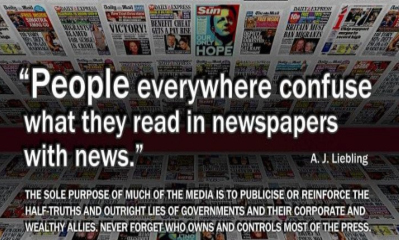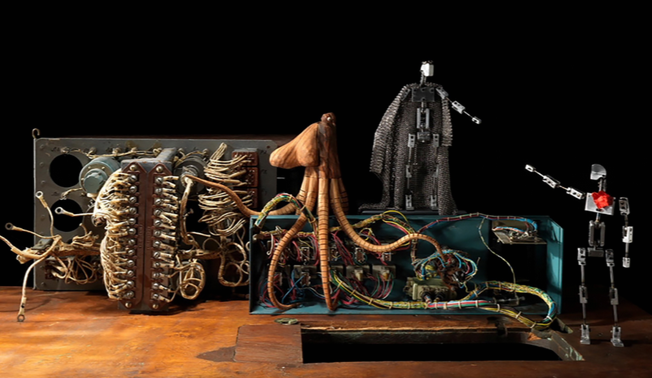Photo: Flickr\C-SPAN
Why does America’s mainsteam media give us coverage of militarism and warfare that is so jingoistic?
Suddenly a shard of history comes flying at me from the ebbing days of World War II, hitting me in the heart. You mean world leaders (not to mention all the rest of us) were serious about transcending — for good — the hell the world had just been through and . . . ending war?
In February 1945, President Franklin Roosevelt, on his return from the Yalta Conference with Great Britain and the Soviet Union, and two months before he died, gave an address to Congress, as quoted recently by Medea Benjamin and Nicolas J.S. Davies:
“It ought to spell the end of the system of unilateral action, the exclusive alliances, the spheres of influence, the balances of power, and all the other expedients that have been tried for centuries — and have always failed. We propose to substitute for all these a universal organization in which all peace-loving nations will finally have a chance to join. I am confident that the Congress and the American people will accept the results of this conference as the beginning of a permanent structure of peace.”
He was talking, of course, about the agreement the three powers had just reached on the creation of the United Nations: “the beginning of a permanent structure of peace.”
Try calming your cynicism and simply hearing those words, not in a context of militarism and mistrust, bitterly conflicting global interests and the corporate dominance of the military industrial complex, but simply as themselves: a coupling of idealism and sanity.
This is the shard that hit me, hollow as it seems. Six months after Roosevelt’s words, the United States leveled Hiroshima and Nagasaki with atomic bombs. World War II ended but the Cold War — and the nuclear arms race — began. So did a vibrant flow of hot wars. In the shadow of these enormities, the establishment of the United Nations has always had a “yada, yada” feel. A united planet? Sure, sounds good. We’ll work on that tomorrow.
But what if the U.N. Charter wasn’t simply a “nice try”? What if these words, declaring the organization’s purpose, were the clarion voice of the future, independent of the shortcomings and hubris of actual world leaders?
The charter begins:
1. To maintain international peace and security, and to that end: to take effective collective measures for the prevention and removal of threats to the peace, and for the suppression of acts of aggression or other breaches of the peace, and to bring about by peaceful means, and in conformity with the principles of justice and international law, adjustment or settlement of international disputes or situations which might lead to a breach of the peace.
2. To develop friendly relations among nations based on respect for the principle of equal rights and self-determination of peoples, and to take other appropriate measures to strengthen universal peace. . . .
These are what we call values. What if they were carved a little more deeply in the collective consciousness of humanity? What if they transcended so-called national “interests,” which is the fallback excuse for endless militarism (and which, of course, is led by the United States)? In the world as it is today, accomplishing something “by peaceful means” usually means going to war, because, you know, it’s necessary, and the evil ones won’t respond to anything but bombs and bullets.
What remains unaddressed by this ongoing attitude is the simple truth that violence begets violence. Every war meant, say, to end terrorism begets terrorism, as it creates an avalanche of collateral damage and unintended consequences. While a lot of people — maybe most of us — understand this, such awareness remains at the margins of power. Within the context of power, I fear, complex, i.e., peaceful, solutions to conflicts become less and less comprehensible. War and violence show up as quick, simple answers to the situation at hand, with the added benefit of “boosting the economy.”
This is accepted as the way is despite the fact that, as William Hartung observed:
“Though it’s seldom noted, virtually any other form of spending creates more jobs than weapons production. In addition, exporting green-technology products would create far larger global markets for U.S. goods, should the government ever decide to support them in anything like the way it supports the arms industry.”
The problem is that “virtually any other form of spending” is quickly labeled socialism. Somehow, the values we need to actually have a future, as they manifest in the U.N. Charter and elsewhere, are apparently too deep for the surface world we live in, for which I blame the mainstream media.
At the dawn of the 21st century, George Bush launched his war against Iraq, which the major news outlets fully endorsed at the time. I’m remembering how, a year later — after the war started going nowhere (who knew it still had nearly 20 years to go?) and no weapons of mass destruction were found — both the Washington Post and New York Times published mea culpas apologizing to the public for not being more critical of the war before it started. Indeed, antiwar opinions were totally marginalized. The Post’s Bob Woodward, the Watergate icon, even publicly acknowledged, “I think I was part of the groupthink.” But neither paper acknowledged that they had learned anything, prompting me to write at the time, “Chillingly missing from the confessionals is the least hint that Big Media coverage of our next war buildup will be different — that is, that today’s hindsight will become tomorrow’s foresight.”
Wars are too easily seen as necessary until they blow up in our faces. We’re at a point where something has to change, where human effort has to be put into planetary survival, which requires creating “a permanent structure of peace.” Is it asking too much that the media bring values, at least as deep as the U.N. Charter, to its reporting, when it comes to matters of war and peace?
Robert Koehler ([email protected]), syndicated by PeaceVoice, is a Chicago award-winning journalist and editor. He is the author of Courage Grows Strong at the Wound.












